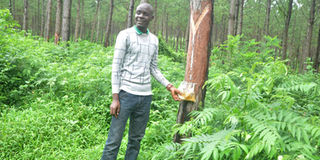Chinese investors under probe over pine tree resin

Extraction. Mr Adolf Busobozi, the NFA forest supervisor in charge of Mubende District, showing some of the resin being tapped in the polythene bag on November 4. PHOTO BY JOSEPHINE NNABBAALE
What you need to know:
- Extraction of resin has got several uses in different industries. In the pharmaceutical industry and food industry, the by-products from resin, turpentine and rosin are used in the production of flavours and fragrances.
- These can be further used to produce cleaning agents, for paints and synthetic rubber production among others.
- However, foresters say uncontrolled and unregulated extraction of resin from forests can be detrimental to forest health and wellbeing and as such should be conducted after careful study of the short, medium and long-term impact.
National Forestry Authority (NFA) has instituted investigations into allegations that some Chinese investors are illegally tapping resin from trees in forests in Mubende District.
Resin, a highly viscous substance rich in organic hydrocarbons, is the sap extracted from trees.
Resin tapping is a process where incisions of the outer layers of pine trees are done leaving behind ‘fish bone’-like patterns on the tree stem. The incisions made on the tree trigger it to produce this resin.
Investigations follow an outcry from a section of private foresters in the district who expressed fear that the sap tapping project may end up endangering their trees in the long run.
According to Mr Adolf Busobozi, the NFA forest supervisor in charge of Mubende District, ever since the Chinese entered an understanding with local foresters to tap resin from their pine trees, some trees have started drying out.
He further said the foresters have binding contracts with NFA to plant pine trees, but they were surprised to learn that they went into another contract with the Chinese company to extract the resin without informing NFA.
He said after realising that their trees are being weakened as a result of tapping resin, they now want NFA to intervene. Mr Busobozi did not name the firms accused of tapping the resin.
A total of 300 hectares of pine has so far been affected around Mubende District, according to Mr Busobozi.
Pine is among the most commercially viable tree species, valued for its timber and wood pulp. Pine wood, which takes between 15 to 18 years to mature, is widely used in high-value carpentry items such as furniture, door and window frames and roofing.
Daily Monitor has learnt that the Chinese investors pay the foresters Shs2, 300 per tree to extract resin annually.
Experience
According to Mr Richard Bakoja, a private forester at Katabalanga Village in Kitenga Sub–county, he terminated his contract with Chinese after learning that the trees were weakening.
“According to the research I carried out, I realised that the method used to extract resin in my forest was not done the same way it is done in other countries like South America and Austria,” Mr Bakoja said.
“When I detected that danger, I stopped immediately. A total of 38,000 trees are currently affected as a result of extracting resin,” he added.
However, Mr Jamir Mujuluzi, a lawyer for Zhong Xin Company, a firm extracting resin from pine trees in Mubende, explained that his client follows international standards while dealing with tree planters.
“All our workers first receive training and are well conversant with the process of tapping resin. So, someone cannot just wake up and terminate the contract basing on flimsy grounds,” Mr Mujulizi added.
Mr Tonny Gumisiriza, a farm manager of Buyigi estate at Nsegwe Village explained that after extraction of resin, some trees have become retarded compared to their usual growth rate.




